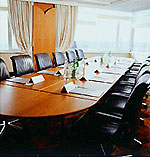Electrifying Russia’s business climate

(Business New Europe – bne.eu – Artem Zagorodnov in Moscow – October 3, 2013)
One of Vladimir Putin’s first acts on being inaugurated president on May 7, 2012 concerned launching a series of “road maps” to improve Russia’s position in the World Bank’s “Doing Business” survey from 118th place to 50th by 2015 and 20th by 2018, by slashing bureaucracy and red tape. With Russia’s economy stagnating and investment scarce, one of the panels at this year’s “VTB Russia Calling!” investment forum focused on the progress than has been made over the last year and looked toward the release of the next survey on October 21.
“This is the first time business and the Russian government have sat down together to develop solutions and monitor their implementation,” said Artem Avetisyan of the Agency for Strategic Initiatives. “Over 800 people have worked on the road maps, with another 14,000 involved via crowdsourcing. At this point the road maps are 49% complete.”
Last year Russia scored lowest in the Getting Electricity (184th place) category with a record 281 days required for a connection versus an average of 98 in Organisation for Economic Co-operation and Development (OECD) countries. “The World Bank has already recognized us as leaders in reforming this sector,” said Sergei Belyakov, deputy economy minister
Oleg Budargin, CEO of the Federal Grid Company, believes big progress has been made in the sector. He noted that in reliability (the number of outages) Russia had already surpassed many developed countries, and that outages in Russia last an average of 0.9 hour versus 1.7 hours in Europe and 3.3 hours globally. “We’ve reduced the cost of an electricity connection by three-times from RUB9,500 in 2009 to around RUB3,000 today. This has led to a subsequent increase in applications from 200,000 then to 416,000 in 2012,” he said.
Knowledge economy
Several business sectors are already benefiting from the improving business climate. “Retail has grown to 20% of the GDP and pays 10% of the nation’s taxes,” said Ilya Yakubson, president of Dixie, one of Russia’s largest and fastest-growing budget retail chains. “There were 3,000 supermarkets opened last year. This is a good barometer you can’t experience 25-30% annual growth like we have in a poor business environment.”
Anatoly Karachinsky, co-founder and president of IBS Group, one of Russia’s largest IT consulting and solutions companies (its subsidiary Luxoft listed on the New York Stock Exchange earlier this year), noted that Russia’s other great competitive advantage apart from hydrocarbons is high-tech, which he ascribes to the country’s superior education system. “Despite a lot of criticism, I’ve compared our public education system to those of other BRICS countries and we are ages ahead,” he said. “In the US and Europe, only 18 and 22% of college graduates respectively, majored in non-humanities a generation ago, because parents pushed their children away from engineering and into fields like business. Nobody knew that computer programming solutions would become so integral to the work of companies like JP Morgan, Boeing and Ford all our clients. The latter we took from Microsoft recently. That’s why Russia is now in a golden age of high-tech programming solutions; we have plenty of engineers.”
The Agency for Strategic Initiatives’ Avetisyan predicts Russia will come in at around 98th place overall in this year’s ‘Doing Business’ ranking. “We’re also in negotiations with the World Bank to have the data be collected not only in Moscow, but in three cities as of next year.”
Many fundamental problems, however, persist. “The number of people interested in opening their own business is catastrophically low in the single digits,” said Belyakov. “More people want to enter the civil service because government still encourages rent-seeking behaviour.”
“It’s easier nowadays to take someone else’s wealth by becoming part of the system than to create your own. We need to increase competition by getting the state out of the economy and stimulating small business. We’re spending a lot of money now on subsidies for big business and they are driving growth, but this model has exhausted itself,” he concluded.
At the opening panel at this year’s event, Olga Dergunova, head of the Federal State Property Management Agency, lauded the government’s work in privatizing over $7bn worth of assets over the last year. To most market watchers, however, the campaign to reduce the state’s 50% share of the $3-trillion economy has been disappointing, with targets constantly scaled back because of “unfavourable market conditions.”
Without an equally focused effort on the part of officialdom to privatize more assets, it’s unlikely there will be much more positive economic news at next year’s forum – regardless of how far ahead Russia jumps in the World Bank’s ranking.
